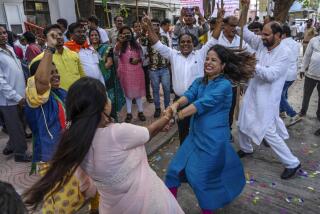Communists Celebrate Nepal Victories : Elections: Katmandu goes Marxist but moderates lead in countryside voting.
- Share via
NEW DELHI — Thousands of Nepali Communists chanted, sang and danced in the streets of Katmandu on Tuesday after their candidates swept all but one seat in the Himalayan capital, and early returns in the nation’s first free elections in more than three decades underscored the emerging power of the world’s only growing Communist movement.
Partial results from outside the capital city, delayed by the need to recover ballot boxes from polling booths as high as 12,000 feet above sea level, were tending to favor the more moderate Nepali Congress Party. It is still expected to emerge as the largest-single force in the country’s new, 205-seat House of Representatives.
But Congress Party leader Krishna Prasad Bhattarai, a respected elder who has served as Nepal’s interim prime minister for the past year, resigned his post Tuesday after losing his Katmandu seat to the general secretary of Nepal’s United Marxist-Leninist Party.
“It is a vote for democracy. It is a vote for independence. It is a vote for the alleviation of poverty,” said Madan Bhandari, the 39-year-old Communist leader who defeated Bhattarai by just 750 of the 53,000 votes cast in the largely poor, urban district.
Bhandari, who lived underground for more more than a decade until he surfaced to help lead last year’s popular, pro-democracy uprising against Nepal’s King Birendra, would be the most likely candidate for prime minister if the Communists should win a majority of the seats in the legislature.
But even if the left falls short, as is expected, analysts in Katmandu said that the Communists’ stunning victories in the capital already foreshadow a new era of political turbulence in the kingdom, a period of instability made all the worse if the Congress Party should win with fewer seats than it needs to form a government on its own.
“Katmandu is the cockpit of national politics, so whatever happens here is important,” said a Western analyst who has lived in the city for several years.
“But the capital is also the epicenter of government, and you’re going to have real problems here now. If Congress continues to sweep in the countryside, they may well come to power, but their ability to manage the nation from this city will be very limited. The Communists can call strikes, protests and paralyze the government or, worse, launch another round of street unrest.”
As many as 200 people died in the streets of Katmandu a year ago during battles between police and pro-democracy demonstrators, among them tens of thousands of hard-core Communists as well as large contingents of Congress Party leaders and supporters.
To placate both forces when the monarchy was forced to give up absolute power and pave the way for last Sunday’s elections, King Birendra approved an interim coalition government representing both the Congress Party and the Communists.
But the recent, sometimes-violent election campaign included bitter attacks between the two groups, and the only Congress Party leaders considered capable of bridging the ideological gap between their party and the Communists have already been rejected in the early election returns.
In addition to the 66-year-old Bhattarai, whose impeccable honesty and diplomacy made him a popular consensus prime minister, the Congress Party’s moderate supreme leader, Ganesh Man Singh, also was embarrassed by the vote. Too old to campaign himself, the 80-year-old leader fielded his wife and son for two of Katmandu’s five seats. Both relatives lost in crushing victories by the United Marxist-Leninist Party alliance.
In the vacuum, the Congress Party’s ambitious and third-highest official, Girija Prasad Koirala, who was leading in the race in the southern plains region known as the Terai, now is emerging as a possible national leader.
But Koirala is fiercely anti-Communist, and he already has indicated that he would prefer establishing a ruling alliance with the nation’s right-wing monarchists, who reassembled into the National Democratic Party to contest the elections after last year’s rebellion. With the Communists in control of Katmandu, such an alliance almost certainly would trigger more street unrest in the capital.
Analysts have already concluded that the most extraordinary trend behind this week’s emerging result is the success, however marginal, of the Communists, since Marxism-Leninism has been discredited throughout much of Europe in recent years.
In fact, among the victors announced Tuesday in races outside Katmandu was Narayan Man Bijukchhe, a firebrand Communist radical who spent years in prison for masterminding the lynching of a government official. Bijukchhe is so extreme in his ideology that he refused to join the Marxist-Leninist election alliance because he viewed it as too conservative.
Throughout the campaign, the Communist candidates--in all, there were seven splinter Communist parties in the race--stressed the huge gap between rich and poor in Nepal, which is routinely ranked among the five poorest nations in the world. They also based their appeal on the performance of Bhattarai’s interim government, which most Nepalis in the capital saw as little different than the repressive monarchy itself in its approach to corruption, police abuse and democratic reform.
And the largest single bloc of Communist support, Nepal’s younger and recently liberated generation of students, teachers and idealistic professionals, predominate in the capital city, which has been all but cut off from the outside world during decades of censorship and autocratic rule.
“It really is as if they’ve been on dry ice, frozen in time for 40 years, and suddenly they came to life as if nothing had happened in the Communist world,” said a diplomat in describing Nepal’s burgeoning Communist parties.
More to Read
Sign up for Essential California
The most important California stories and recommendations in your inbox every morning.
You may occasionally receive promotional content from the Los Angeles Times.












